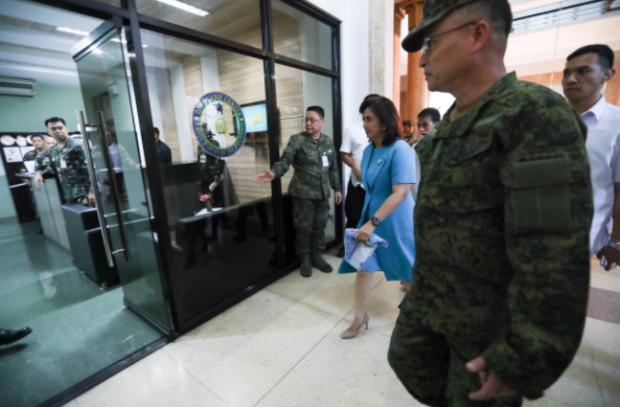
Vice President Leni Robredo visited the AFP General Headquarters on Wednesday, May 24, 2017, for a briefing with top military official on the situation in Mindanao.
Vice President Leni Robredo on Wednesday said this was the time for Filipinos to be united for the sake of the country’s security after President Duterte declared martial law in Mindanao, even as civil society groups warned that the declaration would lead to more human rights violations.
“Let us trust our AFP (Armed Forces of the Philippines),” said Robredo, who visited the AFP headquarters in Camp Aguinaldo on Wednesday morning for a briefing on the situation in Marawi City, which is under attack by a group affiliated with the Islamic State.
Asked if she agreed with the declaration of martial law or if it was an overreaction, she said it was hard to say.
“For me, let us wait for the official declaration of the President. Anyway, under the Constitution, within 48 hours, the President will send information to Congress as to why (martial law) is needed,” Robredo said.
She called on the people to “pray for our men and women who are protecting the people of Marawi” and “for our fellow Filipinos who are caught in the crossfire.”
Respect for human rights
The military assured the Vice President that human rights would be respected while implementing martial law in Mindanao.
“We will respect human rights and we will recognize existing law,” said Marine Col. Edgard Arevalo, AFP public information office chief.
Though supportive of the government’s strong action against local terrorists ensconced in Marawi, civil society groups and nongovernment organizations were wary over Mr. Duterte’s placing Mindanao under martial law.
The groups aired their concern over possible human rights abuses following Mr. Duterte’s statement that his martial law would be “harsh” and would be no different from that imposed by the late dictator Ferdinand Marcos in 1972.
“Let us be clear, the Maute group-Abu Sayyaf and/or [IS] wannabes operating in Marawi must be stopped. The burning of civilian facilities such as the UCCP school must be strongly condemned,” Renato Reyes, secretary general of Bagong Alyansang Makabayan, said in a statement.
“However, we oppose Duterte’s martial law declaration because it is open to all sorts of abuses by state security forces notorious for human rights violations,” Reyes said.
Aerial, artillery strikes
Suara Bangsamoro expressed concern about reports that aerial and artillery bombing would be conducted by state forces to eradicate the Maute group in Marawi.
“We fear for the lives of the civilians who might get caught in the crossfire. We fear for the effects of war to the civilian population,” said Jerome Succor Aba, Suara Bangsamoro chair.
Josua Mata of the labor group Sentro condemned what he labeled as an “atrocious attack” on the people of Marawi but said the declaration of martial law was “a heavy-handed response to the situation that even the AFP now claims is under control.”
The military solution will not provide long-term solutions to terrorism and other problems in Mindanao, according to the indigenous peoples group Katribu.
Diligence in merit review
Warning against the return of dictatorship, the Commission on Human Rights (CHR) called on legislators to exercise “due diligence” in reviewing the merits of Mr. Duterte’s martial rule in Mindanao.
“Let us be reminded of the lessons of the 1972 declaration under a regime of a dictatorship, that we may never again repeat this dark past and continue to recognize the higher value of human dignity at all times,” the CHR said on Wednesday.
It also reminded the government to uphold “the rights of all Filipinos” while addressing the terrorist attacks and the resulting humanitarian crisis in Marawi.
The CHR stressed that despite the declaration of martial rule, the Constitution crafted after Marcos’ downfall assured respect for civil liberties and the protection of the rights to life, and freedom from torture, warrantless arrest, illegal detention and other human rights.
Lawlessness
Karapatan, a nongovernment human rights watchdog, said the martial law declaration would result in gross violations of people’s rights.
“Martial law will inevitably result in intensified military operations, including aerial strikes which can kill and affect hundreds of civilians, and an open season for extrajudicial killings, illegal arrests, torture and other forms of rights violations,” said Karapatan secretary general Cristina Palabay.